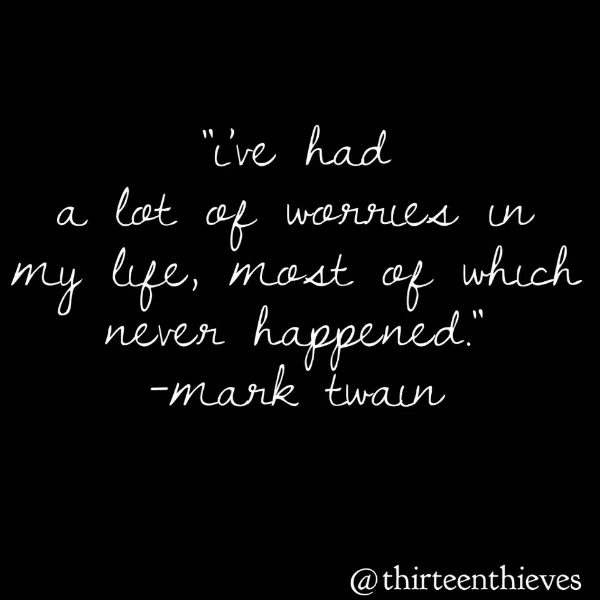An Antidote to Worry
Worries
If you're like me, this quote makes you laugh and twitch nervously at the same time. Being overqualified at multitasking, we find ourselves with overdeveloped worry muscles. We worry about how things went and how they should have gone. We also worry about what will happen when the time comes.
Of course, it’s good to learn from our past, and we must be reasonably ready for the future. Yet habitual worry about past and future along with our culture’s lifestyle of 24/7 digital distraction can lead to the formation of perpetual brain churn. (“Brain churn” is not an actual clinical condition, but I think we all know what it feels like).
Scientific research, though, tells us that our brains are not built to churn. Constant distraction and interruption—either from the outside world or from within ourselves, as is the case with worry—causes our short-term working memory to become less efficient and diminishes our ability to retain longer-term information. Anxiety also impacts our bodies’ immune systems and sleep cycles. Overall, the worry is not a visitor we want to invite for an extended stay.
So if I told you about an antidote to worry that …
* is imminently doable
* has no bad side effects
* is cheap
Mindfulness.
By practicing this technique, you might even get a better night's sleep! In a nutshell, mindfulness is the practice of being attentive to your present moment or experience. This is done in a neutral, non-judgmental way. Although practiced for centuries in Buddhist and other Eastern traditions, it has more recently found its way into our Western awareness. But far from being a new-age kumbaya moment, mindfulness is backed up by well-established studies. For example, we know that the practice of mindfulness is associated with such diverse measures as positive changes at the cellular level, altered brain flow activity, better outcomes in physical and emotional metrics, and improvements in school and work performance. And it is known to help research subjects cope better with stress and anxiety.
So how can we make use of this in practical ways?
First: Try some simple mindfulness techniques. Some of the most far-reaching and well-established mindfulness research is based at the University of Massachusetts Medical Center. For the past 20 years, its practitioners have effectively taught more than 20,000 patients simple mindfulness techniques to help them manage stress, pain, and illness. One technique involves focusing on your breath and gently moving past any interrupting thoughts. The idea behind this technique is to get comfortable with distraction and then calmly train yourself to return to a point of focus.
Here is a simple, starter exercise (this is the one I first tried):
• Breathe regularly and rhythmically, paying attention to the natural pace of your own breath.
• When other thoughts intervene—and they will—simply say to yourself, "Thinking," and then return your attention to your breath moving naturally in and out.
• Start out doing this one minute at a time. If a minute is too long—and yes, it was extremely long for me at first—gear down to 30 seconds. You'll find over time that your ability to switch from a state of distraction to a state of focus improves. Very satisfying.
Next: Expand your moments of mindfulness to other areas of your life. What about when you are walking down the street? Or eating something delicious? Or step out into the sunshine for the first time in the morning? Get your mind in the habit of experiencing the here and now.
Then: Look to make mindfulness practice a part of your regular routine. Can you start at once a week and perhaps increase to a daily event? Maybe your practice will be one minute, or maybe it will be ten minutes long. There is no penalty for going slowly. The only grade being given is an A for effort.
Finally: What do you notice? Perhaps you find you’re better able to move from distraction to a more peaceful, centered stance. Or perhaps you notice you’re more easily able to prevent thoughts of worry from spiraling uncomfortably. Or maybe you’ll just get a better night's sleep! In my personal experience, the effect of mindfulness feels cumulative—as if over time, every attempt builds me a slightly better foundation for becoming focused next time. Mindfulness is easy to start and has the potential for great personal payoff. Think of it as your antidote to worry.
Words by Dr. Ann Park
Source Working Mothers

